|
|
|
Sort Order |
|
|
|
Items / Page
|
|
|
|
|
|
|
| Srl | Item |
| 1 |
ID:
048873


|
|
|
|
|
| Publication |
London, Tauris Academic Studies, 1997.
|
| Description |
vi, 296p.
|
| Standard Number |
1860641059
|
|
|
|
|
|
|
|
|
|
|
|
Copies: C:1/I:0,R:0,Q:0
Circulation
| Accession# | Call# | Current Location | Status | Policy | Location |
| 039172 | 355.00955/CRO 039172 | Main | On Shelf | General | |
|
|
|
|
| 2 |
ID:
162520
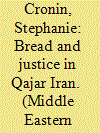

|
|
|
|
|
| Summary/Abstract |
In 1971, E. P. Thompson published a seminal article on eighteenth century English bread riots which was to become a foundational text for the study of such protests. Challenging older elite notions of the irrationality, illegitimacy and even criminality of the ‘mob’, Thompson situated popular direct action in times of food crises within a very specific historical, economic and, most importantly, cultural context. This context produced a deeply held adhesion among the poor to the concept of a ‘moral economy’ and an equally profound rejection of the free market as enshrined in the new political economy of the eighteenth century. This article returns to Thompson's original text in order to assess to what extent his paradigm may be useful in understanding bread riots in Iran. In particular, it examines the evidence which supports the notion that Iran experienced a ‘golden age’ of bread riots in the 1890s and early 1900s, just before and indeed contributing to the outbreak of the constitutional revolution.
|
|
|
|
|
|
|
|
|
|
|
|
|
|
|
|
| 3 |
ID:
102872


|
|
|
| 4 |
ID:
111235
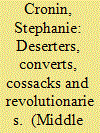

|
|
|
|
|
| Publication |
2012.
|
| Summary/Abstract |
Russians entered Iranian military service in this period in two waves, each wave characterizing a specific period in Iranian-Russian relations. The first was subaltern in origin and came in the form of the deserters from the Russian imperial army who fled to Tabriz in the early nineteenth century and who made a significant contribution to Iranian efforts to build a modern army. The second took place in the late nineteenth-early twentieth century and consisted of representatives of the tsarist military elite, Russian Cossack officers, who came to Iran between 1879 and 1920 and formed the Iranian Cossack Brigade, and their opposites, Caucasian revolutionaries who joined the constitutional movement in order to continue their struggle against the Russian imperial regime. The article raises a series of questions, not only about the extent of Russian influence suggested by the presence of Russian soldiers, but also about its character. Why did Iran place such a high value on Russian military expertise? Who were the Russians who served in the Iranian military? How were they received in Iran? What effect did Iranian society exercise on them and to what extent did the changes transforming Russia affect the roles they played in Iran?
|
|
|
|
|
|
|
|
|
|
|
|
|
|
|
|
| 5 |
ID:
148627


|
|
|
|
|
| Summary/Abstract |
Modern understanding of the institution of slavery and the experience of slave themselves has been largely defined and dominated by a template drawn from the modern plantation slavery of the Americas. Images of slave agency and of abolitionism have been derived from the same template in which slave agency is equated with unambiguous resistance to slavery as such, and abolitionism attributed to a moral response originating within the slave-owning society and possessing a strong redemptive dimension. The weakness of an elite abolitionism regarding ‘Islamic’ slavery in the states of the eastern Mediterranean has often been noted and contrasted with the moral force and redemptive power of Western abolitionism. This article argues first that the ascription of a uniquely Islamic character to Middle Eastern and North African slavery, which in fact shares its key characteristics with practices and notions common to medieval and early modern southern Europe, is a survival of nineteenth century Orientalism. It argues second that the relative weakness of an abolitionist sentiment can best be explained not by the power of an Islamic discourse but by the structures of slavery in the region and especially the forms of agency to which those structures gave rise.
|
|
|
|
|
|
|
|
|
|
|
|
|
|
|
|
| 6 |
ID:
049985
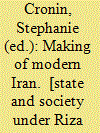

|
|
|
|
|
| Publication |
London, Routledge, 2003.
|
| Description |
xi, 279p.hbk
|
| Series |
RoutledgeCurzon/ BIPS Persian Studies Series
|
| Standard Number |
0415302846
|
|
|
|
|
|
|
|
|
|
|
|
Copies: C:1/I:0,R:0,Q:0
Circulation
| Accession# | Call# | Current Location | Status | Policy | Location |
| 047398 | 955.052/CRO 047398 | Main | On Shelf | General | |
|
|
|
|
| 7 |
ID:
145807
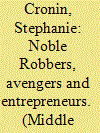

|
|
|
|
|
| Summary/Abstract |
Banditry has been endemic across the Middle East and North Africa. Yet the Middle Eastern experience of banditry has thus far failed to receive sustained academic attention. In particular, the debates stimulated by Eric Hobsbawm's thesis of social banditry have elicited only a few responses from scholars of the Middle East and North Africa, and these largely negative. This article asks to what extent the recent work done in the field of ‘Bandit studies’ helps to elucidate the experience of the Middle East and North Africa. Why has there been such a lack of interest in banditry when the phenomenon itself, and rural crime in general, was so widespread? Why are so few individual bandits celebrated or reviled? What do we mean by banditry in the Middle Eastern context, who became a bandit, why and in what circumstances, what did bandits do and how was this perceived by elites and subalterns, what were the connections between bandits and peasants and between bandits and the worlds of power and, perhaps most importantly, who has written about bandits and what sources have they used?
|
|
|
|
|
|
|
|
|
|
|
|
|
|
|
|
| 8 |
ID:
053795


|
|
|
| 9 |
ID:
101802


|
|
|
| 10 |
ID:
053299
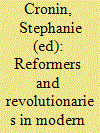

|
|
|
|
|
| Publication |
London, Routledge Curzon, 2004.
|
| Description |
xii, 316p.
|
| Series |
Routledgecurzon/Bips persian studies
|
| Standard Number |
0415331285
|
|
|
|
|
|
|
|
|
|
|
|
Copies: C:1/I:0,R:0,Q:0
Circulation
| Accession# | Call# | Current Location | Status | Policy | Location |
| 048444 | 320.530955/CRO 048444 | Main | On Shelf | General | |
|
|
|
|
| 11 |
ID:
089051
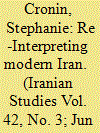

|
|
|
|
|
| Publication |
2009.
|
| Summary/Abstract |
For the nationalist elite of early Pahlavi Iran, the regime's military successes over tribal opposition, whether real or imagined, were welcomed and celebrated. These successes were interpreted as confirmation of their views of tribal power as hostile to modernity, archaic and outmoded, and of Riza Shah as the deliverer of Iran's national salvation. This conceptualization of the "tribal problem" had appeared in tandem with and as a product of modernist ideology in the late nineteenth century, acquired the backing of state power with the rise of the Pahlavi dynasty, and endured until the revolution of 1979. It communicated itself, in diluted form, to Western scholarship, which has been largely content to depict Riza Shah's tribal policies as regrettably brutal, but an unavoidable stage in Iran's progress and "modernization."
Yet this version of tribe-state relations is clearly an ideological construct rather than an historical analysis. The account which follows begins a re-evaluation of tribal politics in modern Iran, focusing especially on the Riza Shah decades when these politics were a site of intense conflict and where the nationalist template was most starkly delineated, and concludes by tracing and re-examining the evolution of the tribe-state dynamic in the decades of land reform and revolution.
|
|
|
|
|
|
|
|
|
|
|
|
|
|
|
|
| 12 |
ID:
121454
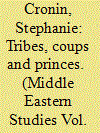

|
|
|
|
|
| Publication |
2013.
|
| Summary/Abstract |
In the decades following the First World War, countries such as Iran, Iraq and Afghanistan used the creation of a modern army as an engine for wider processes of change. Such military-led state-building followed a precedent established in the previous century by Egypt and the Ottoman Empire. In these countries, military revolutions involving the introduction of new technologies and military tactics made essential broader transformations in tax, administrative and educational structures to finance the army and provide literate manpower. In Saudi Arabia, however, no such military revolution, dragging society in its wake, took place. Military expansion was funded not by domestic taxation but by oil royalties provided by a foreign concession, recruitment remained voluntary, avoiding the administrative centralization and bureaucratic rationality demanded by conscription, while both the integrative function of conscription and the emergence of a professional officer corps were sacrificed to the imperative of sustaining the tribal and family ascendancy of the al-Saud. Saudi Arabia entered the twenty-first century having experienced not military modernization but rather military modernization in reverse, the strength of tribal and family ties and patronage not weakened but rather embedded ever more deeply within a system of patrimonial rule.
|
|
|
|
|
|
|
|
|
|
|
|
|
|
|
|
|
|
|
|
|